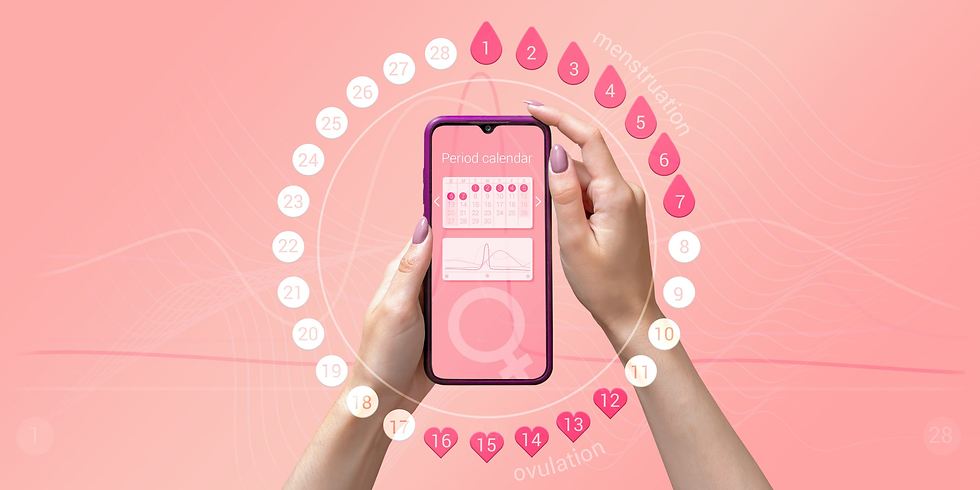Are Period Tracking Apps Helpful? Insights at the Individual and Epidemiological Scale
- Nicole Winship
- Jul 28, 2025
- 3 min read

Period tracking apps have rapidly grown in popularity, with millions of users across the globe turning to digital platforms such as Clue, Flo, Natural Cycles, and Ovia. These tools help individuals monitor menstrual cycles, track ovulation, and log symptoms, offering greater insight into their reproductive health. But beyond personal use, these apps may also hold significant potential for public health research. In this article, we explore the usefulness of period tracking apps on both individual and population levels.
Empowering Individuals Through Menstrual Literacy
On an individual level, period tracking apps have become a powerful tool in improving menstrual literacy. By logging their cycles, symptoms, and ovulation patterns, users gain a better understanding of their bodies. This awareness can help people manage symptoms of PMS, identify irregularities, and make informed decisions about contraception or conception.
These apps are especially valuable for those trying to conceive. A randomized controlled trial showed that women who used an app-based system in conjunction with urine tests for estrone-3-glucuronide (E3G) and luteinizing hormone (LH) were significantly more likely to conceive within two menstrual cycles, compared to those who did not use ovulation tracking tools. Timing intercourse during the fertile window, as guided by these apps, was a key factor in improving conception rates.
For others, particularly in regions with restricted access to reproductive services, such as parts of the United States after the overturning of Roe v. Wade, period tracking apps can be part of a broader strategy for bodily autonomy. Some users are now paying closer attention to their menstrual cycles to avoid unintended pregnancies or ensure timely access to abortion services where legal.
However, concerns remain about data privacy. In the U.S., some fear that menstrual data could potentially be accessed by third parties or used as evidence in legal proceedings related to abortion. Transparency from app developers and robust data protection policies are crucial to maintaining user trust.
A New Tool for Epidemiological Research
Beyond personal health, period tracking apps are an emerging resource for epidemiological research. With millions of users voluntarily sharing anonymized data, researchers gain access to large datasets without traditional recruitment challenges. These datasets can help analyze patterns in ovulation timing, menstrual regularity, and symptom prevalence across diverse populations.
Such real-world data can also shed light on broader reproductive health trends.The potential for large-scale, real-time data collection makes these apps a valuable addition to public health research.
However, it's essential to acknowledge limitations. User data may not be representative of all demographics, and self-reported information can introduce bias or inaccuracies. Furthermore, ethical considerations around consent, data ownership, and transparency must be front and center in research efforts using app-derived data.
Conclusion
Period tracking apps offer clear benefits at both the individual and population level. They empower users to take control of their reproductive health, support those trying to conceive, and may even help users navigate restrictive reproductive health landscapes. Simultaneously, they offer researchers a unique window into menstrual health trends at scale.
For these tools to reach their full potential, privacy, data security, and ethical data use must remain a top priority. With proper safeguards, period tracking apps can be a powerful force for both personal empowerment and public health advancement.
References
Johnson S, Stanford JB, Warren G, Bond S, Bench-Capon S, Zinaman MJ. Increased Likelihood of Pregnancy Using an App-Connected Ovulation Test System: A Randomized Controlled Trial. J Womens Health (Larchmt). 2020 Jan;29(1):84-90. doi: 10.1089/jwh.2019.7850. Epub 2019 Sep 4. PMID: 31483187; PMCID: PMC6983750.
Kelly BG, Habib M. Missed period? The significance of period-tracking applications in a post-Roe America. Sex Reprod Health Matters. 2023 Dec;31(4):2238940. doi: 10.1080/26410397.2023.2238940. PMID: 37681963; PMCID: PMC10494721.
Schantz JS, Fernandez CSP, Anne Marie ZJ. Menstrual Cycle Tracking Applications and the Potential for Epidemiological Research: A Comprehensive Review of the Literature. Curr Epidemiol Rep. 2021 Mar;8(1):9-19. doi: 10.1007/s40471-020-00260-3. Epub 2021 Feb 20. PMID: 34055569; PMCID: PMC8162175.
Assessed and Endorsed by the MedReport Medical Review Board





